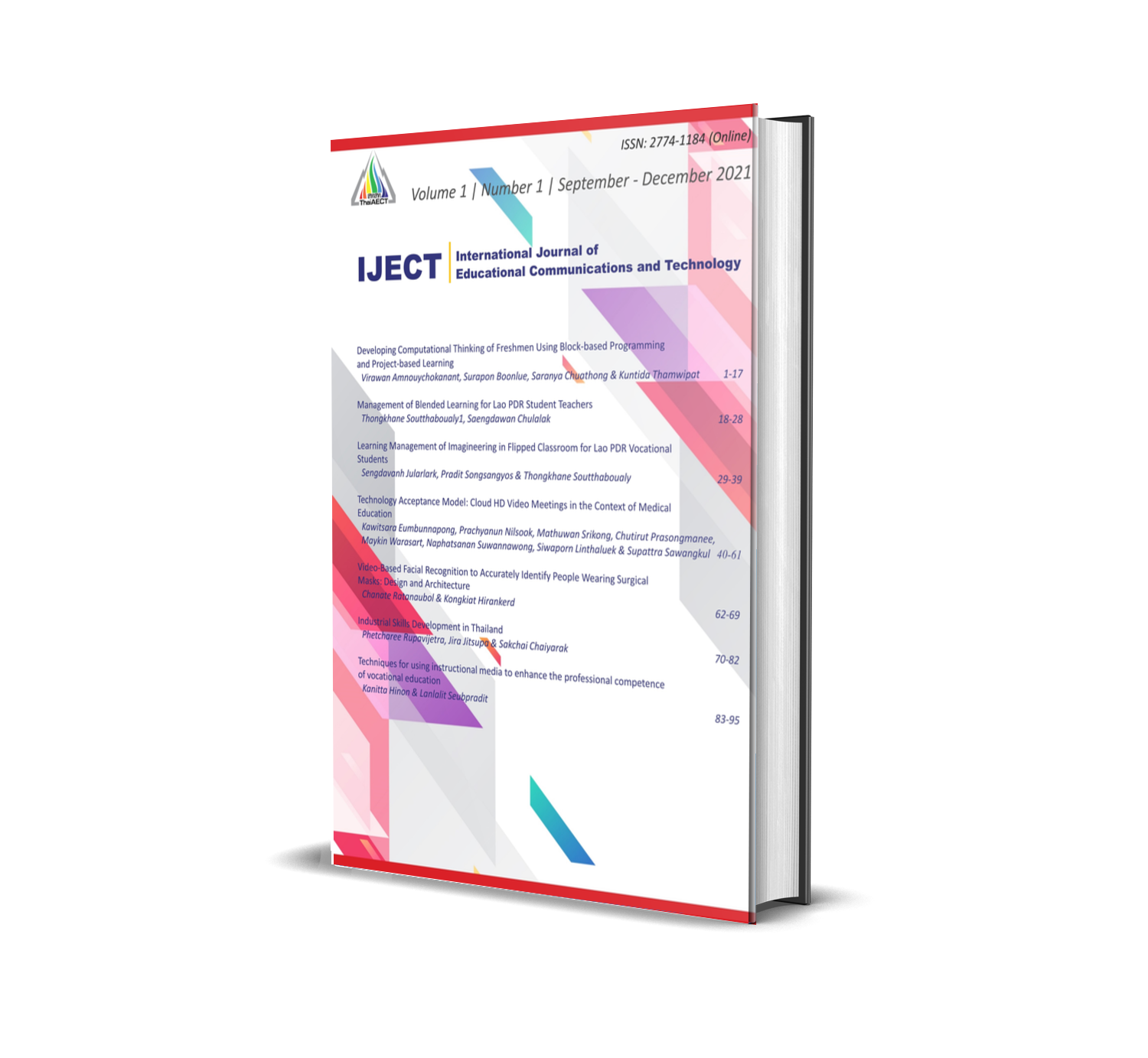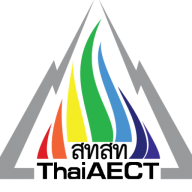Developing Computational Thinking of Freshmen Using Block-based Programming and Project-based Learning
Keywords:
block-based programming, computational thinking, COVID-19, online learning, project-based learningAbstract
In this study, we carried out an experiment with 90 participants (first-year students enrolled in a Bachelor of Education Program in educational technology and communications at King Mongkut's University of Technology Thonburi). At the beginning of the experiment, all participants were asked to take computational thinking (CT) test to measure their CT. During the sessions, all participants were taught by Microbit and needed to make groups to create Microbit artifacts. Although the severity of the COVID-19 pandemic lessened in Thailand, we provided a combination of synchronous learning (live streaming meetings via Zoom) and asynchronous learning (learning management system via Moodle) to prevent the gathering of students in the classroom. However, because project-based learning requires collaboration, members in the group were allowed to meet to complete the project. After the experiment, they took the CT test again. The results show that there was a great improvement in students’ post-test results. An assessment based on the investigation of created artifacts demonstrates that the participants acquired CT skills related to programming at a proficient level.
References
Angeli, C., & Giannakos, M. 2020. Computational thinking education: Issues and challenges. Computers in Human Behavior, 105, 106185.
Armoni, M. (2012), Teaching CS in kindergarten: How early can the pipeline begin?. Acm Inroads, 3(4), 18–19.
Bao, X., Qu, H., Zhang, R., & Hogan, T. P. (2020). Modeling reading ability gain in kindergarten children during COVID-19 school closures. International Journal of Environmental Research and Public Health, 17(17), 6371.
Bebras Organization, 2017, Talent Search 2017 Online Solutions [Online], Available: https://olympiad.org.za/talent-search/wp-content/uploads/sites/2/2017/08/TS-2017- Solutions-Guide.pdf [2019, January 1].
Bedggood, R. E., & Donovan, J. D. (2012). University performance evaluations: what are we really measuring?. Studies in Higher Education, 37(7), 825–842.
Bell, S. (2010), Project-based learning for the 21st century: Skills for the future. The clearing house, 83(2), 39–43.
Bilgin, I., Karakuyu, Y., & Ay, Y. (2015). The effects of project based learning on undergraduate students’ achievement and self-efficacy beliefs towards science teaching. Eurasia Journal of Mathematics, Science and Technology Education, 11(3), 469–477.
Boaler, J. (1999). Mathematics for the moment, or the millennium. Education Week, 17(29), 30– 34.
Boyle, P., & Trevitt, C. (1997). Enhancing the quality of student learning through the use of subject learning plans. Higher education research & development, 16(3), 293–308.
Brown, N. C., Sentance, S., Crick, T., & Humphreys, S. (2014). Restart: The resurgence of computer science in UK schools. ACM Transactions on Computing Education (TOCE), 14(2), 1–22.
Chang, C. C., Kuo, C. G., & Chang, Y. H. (2018). An assessment tool predicts learning effectiveness for project-based learning in enhancing education of sustainability. Sustainability, 10(10), 3595.
Curzon, P., Dorling, M., Ng, T., Selby, C. and Woollard, J. (2014), Developing computational thinking in the classroom: a framework [Online], Available: http://www.chimed.ac.uk/publicdocs/WP259.pdf [2019, July 16].
Denning, P. J. (2017). Computational Thinking in Science. American Scientist, 105(1), 13.
Jalinus, N., Nabawi, R. A., & Mardin, A. (2017, January). The seven steps of project based learning model to enhance productive competences of vocational students. In International Conference on Technology and Vocational Teachers (ICTVT 2017). Atlantis Press. 251–256.
Kokotsaki, D., Menzies, V., & Wiggins, A. (2016). Project-based learning: A review of the literature. Improving schools, 19(3), 267–277.
Marcelino, M. J., Pessoa, T., Vieira, C., Salvador, T., & Mendes, A. J. (2018). Learning computational thinking and scratch at distance. Computers in Human Behavior, 80, 470– 477.
Mustafa, N. (2020). Impact of the 2019–20 coronavirus pandemic on education. International Journal of Health Preferences Research, 1–12.
Ngereja, B., Hussein, B., & Andersen, B. (2020). Does Project-Based Learning (PBL) Promote Student Learning? A Performance Evaluation. Education Sciences, 10(11), 330.
Pérez-Marín, D., Hijón-Neira, R., Bacelo, A., & Pizarro, C. (2020). Can computational thinking be improved by using a methodology based on metaphors and scratch to teach computer programming to children?. Computers in Human Behavior, 105, 105849.
Perrone, V. (1991). Expanding Student Assessment. Association for Supervision and Curriculum Development, 1250 N. Pitt Street, Alexandria, VA 22314.
Shih, W. L., & Tsai, C. Y. (2017). Students’ perception of a flipped classroom approach to facilitating online project-based learning in marketing research courses. Australasian Journal of Educational Technology, 33(5), 32–49.
Suryana, F., Jalinus, N., Rahmad, R., & Efendi, R. (2020). Cooperative project based learning models in programming languages: A proposed. International Journal of Advanced Science and Technology, 29(6), 1876–1886.
Sysło, M. M., & Kwiatkowska, A. B. (2015). Introducing a new computer science curriculum for all school levels in Poland. In International conference on informatics in Schools: Situation, evolution, and perspectives, 141–154.
Topalli, D., & Cagiltay, N.E. (2018), Improving programming skills in engineering education through problem-based game projects with Scratch. Computers & Education, 120, 64–74.
Touloumakos, A. K. (2020). Expanded Yet Restricted: A Mini Review of the Soft Skills Literature. Frontiers in Psychology, 11, 2207. UNESCO, U. (2020). COVID-19 educational disruption and response. UNESCO.
VanDerLinden, K. (2014). Blended learning as transformational institutional learning. New directions for higher education, 2014(165), 75–85.
Vivian, R., Falkner, K., & Falkner, N. (2014). Addressing the challenges of a new digital technologies curriculum: MOOCs as a scalable solution for teacher professional development, Research in Learning Technology, 22, 1 – 19.
Voštinár, P., & Knežník, J. (2020, April). Experience with teaching with BBC micro: bit. In 2020 IEEE Global Engineering Education Conference (EDUCON). IEEE. 1306–1310.
Weintrop, D., & Wilensky, U. (2019). Transitioning from introductory block-based and textbased environments to professional programming languages in high school computer science classrooms. Computers & Education, 142, 103646.
Wing, J. (2011). Research notebook: Computational thinking—What and why. The link magazine, 6, 20–23.Wing, J. M. (2006). Computational thinking. Communications of the ACM, 49(3), 33–35.
Wing, J. M. (2008). Computational thinking and thinking about computing. Philosophical Transactions of the Royal Society A: Mathematical, Physical and Engineering Sciences, 366(1881), 3717–3725.
Wu, T. T., & Wu, Y. T. (2020). Applying project-based learning and SCAMPER teaching strategies in engineering education to explore the influence of creativity on cognition, personal motivation, and personality traits. Thinking Skills and Creativity, 35, 100631.
Downloads
Published
How to Cite
Issue
Section
License
Copyright (c) 2021 International Journal of Educational Communications and Technology

This work is licensed under a Creative Commons Attribution-NonCommercial 4.0 International License.







